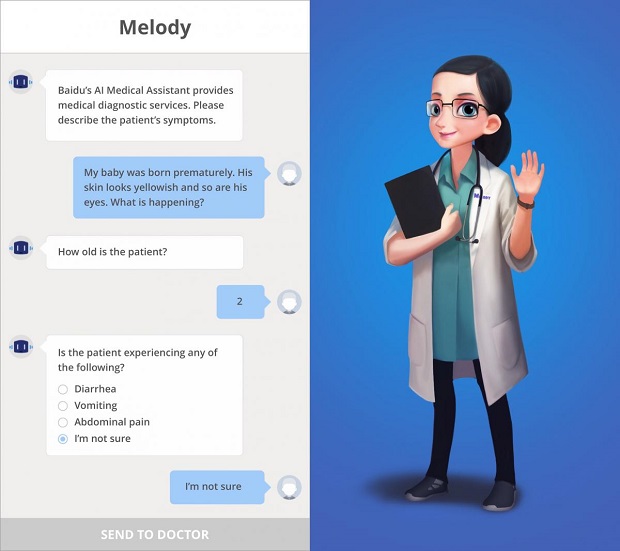Chinese search engine giant Baidu is launching a “conversational” medical chatbot designed to make diagnosing illnesses easier.

The bot is named Melody and comes built into the company’s iOS and Android Baidu Doctor app, which launched in China in 2015.
Baidu Doctor allows users to contact local doctors, book appointments, and ask questions, with the chatbot intended to speed up this process.
Melody builds on the Baidu Doctor app, which launched in China in 2015. Patients can open the app and ask a question, and Melody will respond with context-relevant questions to clarify information such as symptom frequency or duration.
Previously, the Baidu Doctor app allowed patients to ask doctors direct questions, schedule appointments and look up health information, but with Melody, Baidu aims to enhance that online experience by making it faster, and make it closer to a human conversation.
“We believe this natural type of interaction will help patients feel more comfortable with their doctors and result in a more beneficial patient-doctor relationship,” Baidu’s Big Data Lab senior director Wei Fan said in a statement.
By using advanced deep learning and natural language processing technologies developed by Baidu, Melody can also ask about additional symptoms not mentioned by the patient but that may provide extra insight to help the doctor get a complete picture of the patient and make a more informed decision.
“Melody is designed to help both doctors and patients. By focusing on the medical assistant space, we’ve built a conversational bot that can give highly-customized and situation-appropriate responses to a patient’s query,” Baidu’s chief scientist Dr. Andrew Ng said in a statement. “As Melody has more conversations, it will learn and keep getting better. This is just the start of a much larger AI-driven transformation of the healthcare industry.”
Melody was primarily designed to save time, but also serves as a sort of stop-gap solution for the worldwide issue of doctor shortages.
“With dire shortages of physicians around the world, the need is greater than ever for intelligent solutions that can help doctors facilitate accurate recommendations more quickly,” Ng said in a statement. “Baidu aims to provide a powerful solution that will alleviate the burden on healthcare systems by helping to bridge the gap between patients and doctors.”
